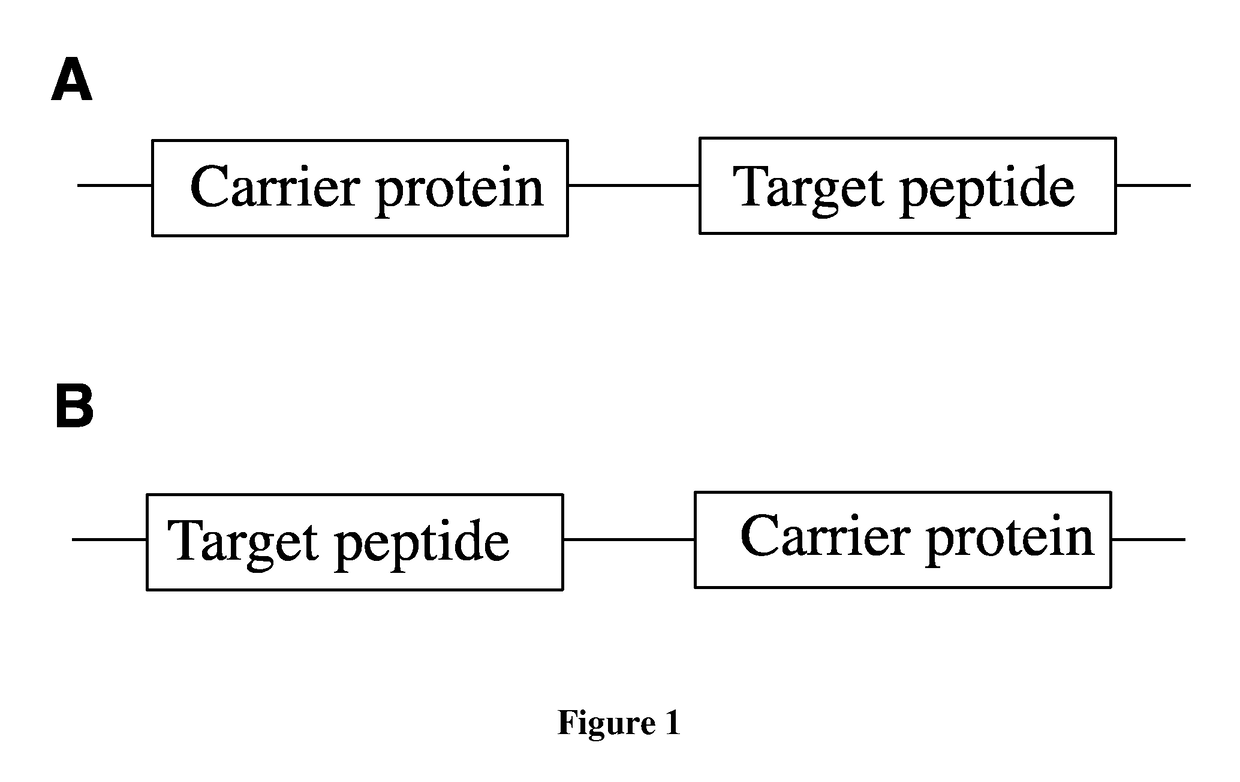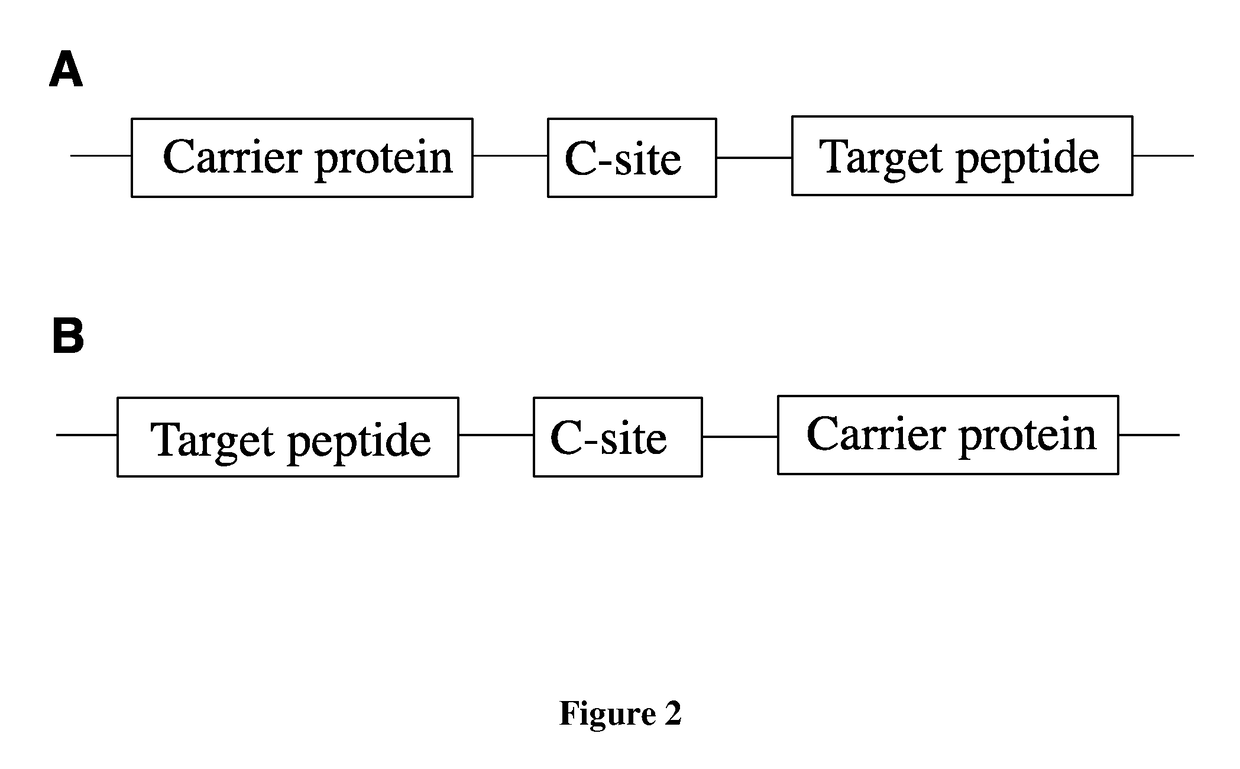Fusion proteins of superfolder green fluorescent protein and use thereof
a superfolder green fluorescent protein and protein technology, applied in the field of recombinant peptides, can solve the problems of low yield, difficult to maintain affordable prices in the future, and tedious protection, and achieve the effect of efficient translation
- Summary
- Abstract
- Description
- Claims
- Application Information
AI Technical Summary
Benefits of technology
Problems solved by technology
Method used
Image
Examples
example 1
Construction of Expression Vector pSFGFPN-NcoI
[0078]The construction of all plasmids in this invention followed standard cloning and QuikChange site-directed mutagenesis procedures using Phusion high-fidelity DNA polymerase from New England Biolabs Inc. Sequences of all plasmids constructed were verified by DNA sequencing. All oligonucleotide primers were purchased from Integrated DNA Technologies, Inc.
[0079]The plasmid pSFGFPN-NcoI contained a codon-optimized gene coding superfolder green fluorescent protein with a C-terminal 6× His-tag. There was also a NcoI restriction site that overlaped the first two amino acid coding nucleotides of the superfolder green fluorescent protein gene. This site was generated for the future cloning of a target peptide gene into the plasmid to form a fusion gene with superfolder green fluorescent protein at its C-terminus. To construct pSFGFPN-NcoI, two oligonucleotide primers 5′-AATTAACCATGGTTAGCAAAGGTG-3′ and 5′-GATCTCGAGCTTTAATGGTGATGATGATGGTGGCTGC...
example 2
Construction of Expression Vector pSFGFPC-MCS
[0080]The plasmid pSFGFPC-MCS contained a codon-optimized gene coding superfolder green fluorescent protein with a N-terminal 6× His-tag. There was also a multiple cloning site (MCS) containing restriction sites for XhoI, BglII, PstI, KpnI, EcoRI and HindIII at the C-terminal end of the superfolder green fluorescent protein gene. This multiple cloning site was generated for the future cloning of a target peptide gene into the plasmid to form a fusion gene with superfolder green fluorescent protein at its N-terminus. To obtain pSFGFPC-MCS, two primers 5′-AACCATGGTTCACCATCATCATCACCATGCGGCGAGCAA-3′ and 5′-ATCTCGAGCTTTATACAGTTCATCCATA-3′ were used to amplify the same synthetic superfolder green fluorescent protein DNA using PCR. The first primer contains a NcoI restriction site; the second primer contains a XhoI restriction site. The PCR-amplified DNA was digested with NcoI and XhoI restriction enzymes for three hours. The finally digested DN...
example 3
Construction of Expression Vector pSFGFPN-prolispro
[0081]The expression vector pSFGFPN-prolispro contained a gene coding the precursor protein (prolispro; its amino acid sequence is shown as SEQ ID NO:7) of human insulin analog lispro fused at the N-terminus of superfolder green fluorescent protein that also has a C-terminal 6× His tag. In front of the prolispro gene, a tripeptide Met-Ala-Arg coding sequence was inserted for the following easy cleavage of this tripeptitide with trypsin. The linker peptide between prolispro and superfolder green fluorescent protein was an octapeptide Arg-Glu-Asn-Leu-Tyr-Phe-Gln-Gly. This octapeptide can be hydrolyzed by both trypsin after Arg and TEV protease between Gln and Gly. The DNA sequence for this octapeptide is also codon optimized for efficient translation in E. coli. To construct pSFGFPN-prolispro, two primers 5′-GAATTAACCATGGCGCGTTTCGTTAACCAACACCTG-3′ and 5′-AACCCATGGCTCCCTGAAAATACAGGTTTTCACGATTACAGTAATTTTC-3′ were used to amplify a synth...
PUM
| Property | Measurement | Unit |
|---|---|---|
| pH | aaaaa | aaaaa |
| pH | aaaaa | aaaaa |
| pH | aaaaa | aaaaa |
Abstract
Description
Claims
Application Information
 Login to View More
Login to View More - R&D
- Intellectual Property
- Life Sciences
- Materials
- Tech Scout
- Unparalleled Data Quality
- Higher Quality Content
- 60% Fewer Hallucinations
Browse by: Latest US Patents, China's latest patents, Technical Efficacy Thesaurus, Application Domain, Technology Topic, Popular Technical Reports.
© 2025 PatSnap. All rights reserved.Legal|Privacy policy|Modern Slavery Act Transparency Statement|Sitemap|About US| Contact US: help@patsnap.com



